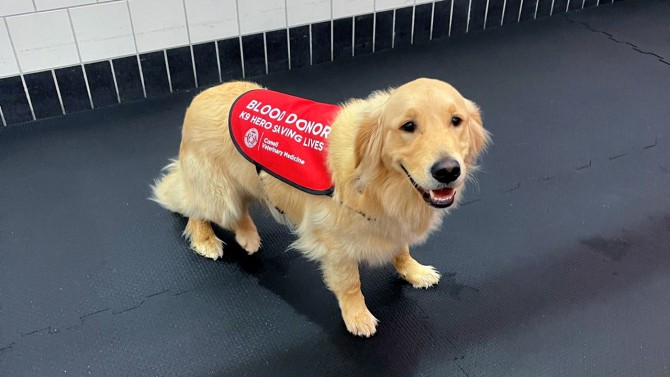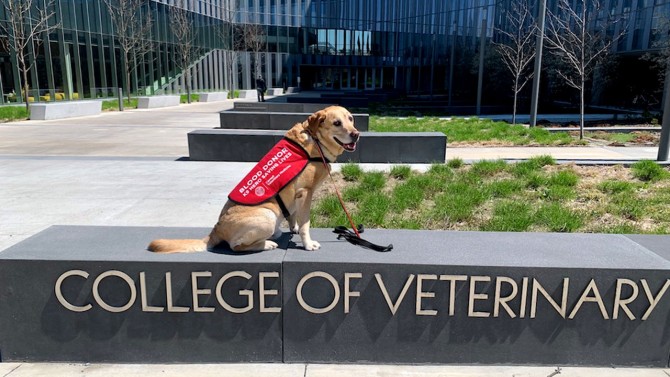
Hubble, a German wirehaired pointer, has blood drawn.
Doggy donors, students help expand animal blood bank
By Melanie Greaver Cordova
Thanks to the help of local canine donors and student volunteers, the Cornell University Hospital for Animals (CUHA) will soon have its own fully internal system of procuring blood for its patients – a major benefit in the face of nationwide shortages.
And when they’re done donating blood, instead of a cookie, all the dogs get a can of chicken.
“This is a huge, exciting step for our animal hospital,” said licensed veterinary technician specialist Carol Frederick. She, alongside faculty liaison Dr. Galina Hayes, leads the blood donor program at CUHA.
There are currently only a handful of veterinary blood banks across the country, and those relative few are experiencing shortages. This makes obtaining blood a challenge for some animal hospitals that depend on their products.
“The pandemic has contributed to the shortage,” Hayes said. “We have seen a recent rapid increase in caseload, for example, in our emergency room at CUHA – this year has a 35% increase compared with last. This has been coupled with staffing shortages at some of the external blood banks, limiting supply.”
A veterinary blood bank collects, tests and stores blood, and separates it into component parts – like red blood cells, platelets and various plasma products – for specialized use in certain procedures and therapies. Since the donated blood is processed on site without the need for transport, products with a short shelf life, like platelet concentrate, are now available for patients whose blood can’t clot and need urgent platelet replacement due to immune disease or blood loss.
“I wanted to allow my dogs to help others that needed blood. I would hope someone would do the same for my dogs,” said senior lecturer Jordyn Boesch, D.V.M. ’06, whose golden retrievers Rosie and Winnie participate in the program.
Boesch works on CUHA’s anesthesia and pain medicine service and has seen her dogs directly impact the lives of ill animals at Cornell. “One of our technicians brought her beloved elderly dog into the emergency service. My dog Rosie’s blood was transfused into him, and this allowed him to stabilize enough that he could spend a few more precious days with his family,” Boesch said. “I was so gratified to learn that Rosie gave him and his whole family extra time together.”
A new veterinary student volunteer group enabled the expansion.
“We have over 50 members who are a huge help with screening donors as well as the actual donations,” Hayes said. “They practice their communication skills by interacting with the owners of the donors, perform physical exams and practice venipuncture, and they provide the personnel essential to running the program. Everyone benefits.”
To expand the blood bank, CUHA purchased a temperature-controlled refrigerator that keeps blood components at approximately 4 degrees Celsius. They also use a specialized centrifuge and an ultralow freezer, among other equipment and storage.
Frederick regularly sends calls for new donor volunteers to the College of Veterinary Medicine community to build the donor base, but welcomes volunteers from any source. Dogs must be between 1 and 5 years old, weigh at least 62 pounds, have a relaxed temperament and be available to donate every few months. All breeds are considered, but the program prefers greyhounds, boxers, Irish wolfhounds, German shepherds, Doberman pinschers and pit bulls.
“Our ultimate goal is to have approximately 50 dogs in the program so we can set up a routine schedule,” Frederick said. “That way we’re collecting blood proactively, not reactively.”
Donors undergo a rigorous screening process and thorough bloodwork to ensure they’re healthy enough to donate and won’t inadvertently give the recipient anything harmful. All blood collected is for dedicated use in the hospital and won’t be sold elsewhere.
Volunteers get some perks in return. In addition to a free yearly physical exam, dogs receive free basic vaccines, comprehensive bloodwork, a box of treats and dog food at every donation visit, a $20 credit on their next hospital bill and a year’s worth of heartworm, flea and tick prevention. CUHA also created a vest for the animals to showcase their role as blood donors.
“The perks help us build the donor base, but they’re also to help the animals,” Frederick said. “On our end, we need to know these dogs are healthy enough to donate, so it’s a win-win.” Everybody gets a can of chicken when they’re done, she added. “We want this to be a good experience for the dogs, too.”
If you would like to apply for your dog to become a donor, and it meets the above guidelines, please reach out to Frederick at c.frederick@cornell.edu.
Read the full version of this story on the veterinary website.
Melanie Greaver Cordova is assistant director of communications at the College of Veterinary Medicine.
Media Contact
Get Cornell news delivered right to your inbox.
Subscribe


